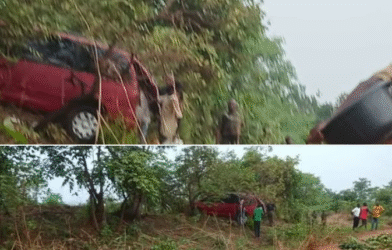426
On July 24, 2024, President Bola Ahmed Tinubu took a major step toward addressing the long-standing development imbalances in Nigeria by signing the South-East Development Commission (SEDS) Bill into law. This legislation is a beacon of hope for the neglected region and a significant step in the quest for equitable development in Nigeria.
The Act is a welcome response to the clarion calls for redress in the region since the end of the civil war in January 1970.
The South-East has been struggling for years to rebuild and recover from the war devastations.
Despite its vast potential and contributions to national development, the region has been plagued by inadequate infrastructure, limited access to basic amenities, and a general sense of marginalisation.
The SEDC Act represents a consolidated response to the development challenges. It can bridge identified gaps to promote equitable growth in the region.
By setting up a commission dedicated to overseeing development in the southeast, President Bola Tinubu’s government has demonstrated a commitment to democratise access to equal opportunities and equitable distribution of resources to put the region at par with other parts of the country.
It is a testament to the government’s recognition of the need for a targeted approach to development, and a willingness to address the region’s development challenges and promote inclusive growth.
“This Act is a testament to our commitment to building a nation on the fulcrum of fairness, equity, and unity,” President Tinubu said at the signing ceremony.
The Act portends several positive developments for the South-East region, including economic growth and development opportunities. By investing in critical sectors, such as agriculture, manufacturing, and tourism, the Commission can help stimulate economic activity and create jobs, thereby boosting the region’s economy and improving the quality of life for its residents.
The focus on rebuilding and rehabilitation is a critical component of the Commission’s mandate aimed at addressing the region’s deplorable infrastructure, such as roads, housing, and other social services, such as education and healthcare.
The region’s infrastructure has been in disrepair for decades, hindering economic growth and development with barriers to businesses and limited access to essential goods and services.
By investing in reconstruction and rehabilitation, the Commission can help unlock the region’s economic potential and create an environment conducive to growth and development.
The region’s infrastructure deficit has had a disproportionate impact on vulnerable populations, including people with low income, women, and children.
By addressing these inadequacies, the Commission can help reduce poverty, improve living standards, and enhance the people’s quality of life.
Also, the reconstruction and rehabilitation of infrastructure can help stimulate economic activity in the region, create more jobs, stimulate economic growth, and boost access to markets, reducing unemployment and promoting sustainable development.
Finally, the focus on reconstruction and rehabilitation demonstrates a commitment to address the root causes of the region’s development challenges. Instead of simply providing temporary solutions or quick fixes, investments in long-term solutions will help transform the region’s economic landscape and instil hope for a brighter and more sustainable future.
The Act also seeks to tackle ecological and related environmental problems in Southeast states, which have endured numerous ecological problems, including erosion, pollution, environmental degradation and other climate change-effects with devastating impacts on local communities.
Also, by investing in critical sectors, such as agriculture, manufacturing, and tourism, the Commission can help boost food security and spur the industrialisation of the region.
President Tinubu’s willingness to address complaints of marginalisation and neglect is considered a major step toward tackling injustices and inequalities in Nigeria.
This will engender inclusive governance and participation of local communities and other stakeholders in decision-making, to ensure that development initiatives align with needs and priorities. This reflects a leadership vision and determination to build a just and prosperous country.
Regional growth is critical for national development, as it enables a country to harness its diverse resources and talents to promote economic growth, social cohesion, and political stability.
Prioritizing regional growth can create a more balanced and inclusive development trajectory, reducing the risks of marginalisation and social unrest.
The work of the South East Development Commission can produce ripple effects on the promotion of regional growth and development across Nigeria’s six geopolitical zones.
By sharing best practices, expertise, and resources, a culture of collaboration and cooperation, can be activated to drive national development and promote shared prosperity.
Lawmakers have hailed the SEDC Act as a game-changer for the South East, with Senator Uche Ekwunife noting that: “This … is a dream come true for our people. It’s a step toward addressing past injustices and paving the way for a brighter future.”
Deputy Speaker of the National Assembly, Hon. Benjamin Kalu, the sponsor of the SEDC bill, praised the President’s commitment to the region’s development.
“I am thrilled to see the President’s enthusiasm for this project. His leadership and vision will be crucial in driving the Commission’s success. We must work together to ensure the Commission receives the necessary resources and support to deliver its mandate,” he affirmed.
However, some critics argue that the Commission’s success would depend on adequate funding and implementation of its programmes and activities.
House of Representatives Member Samuel Onuigbo has also cautioned that: “The devil is in the details. We must ensure that the Commission is properly funded and staffed to deliver its promises.”
Despite the concerns, the South East Development Commission Act represents hope for a neglected region.
As promised by President Tinubu: “This is a new dawn for the South East. We will work tirelessly to ensure that this Commission brings prosperity and development to our people.”
Dr. Sonny Onyegbula, A Legal Consultant, Wrote From Florida, USA















Comments are closed